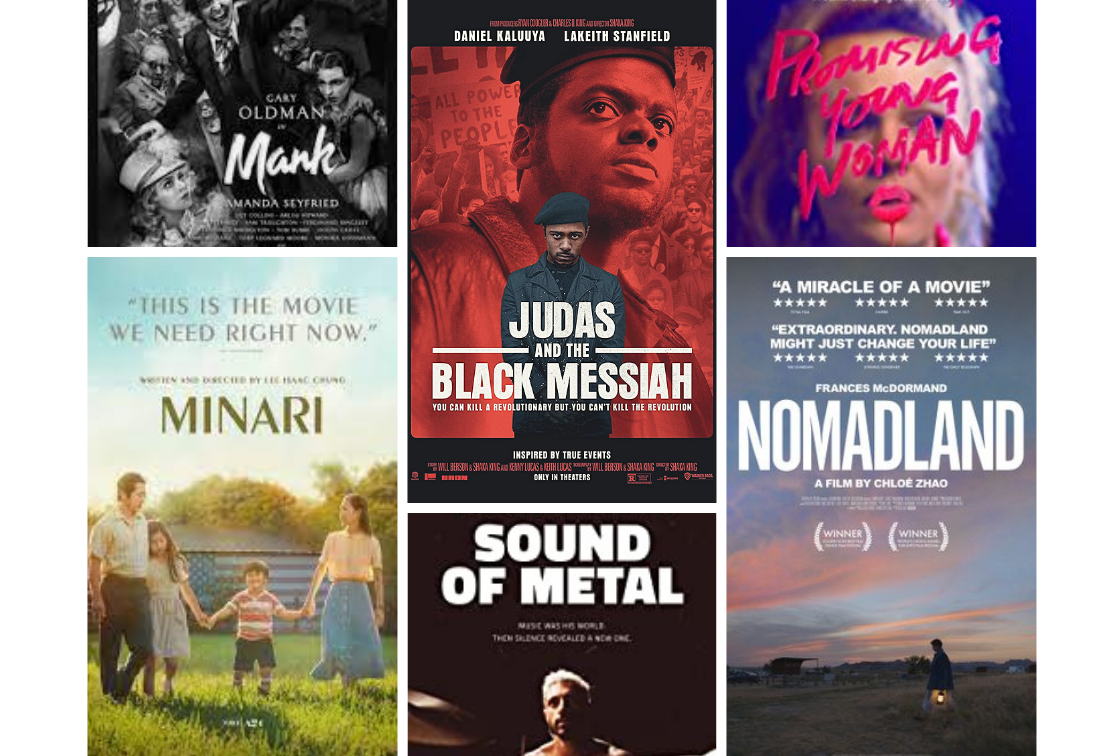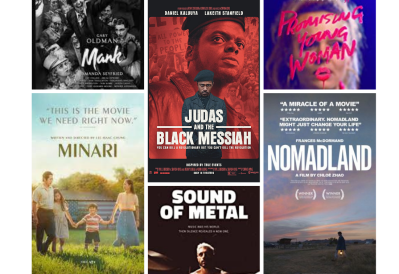The Academy of Motion Picture Arts and Sciences announced this year’s nominees for Best Picture on Monday. It’s been an odd year for cinema, with theaters everywhere closed for the bulk of 2020 and streaming taking over as the dominant way people watch new movies. Understandably, you might have missed some of this year’s most critically acclaimed films. The Dispatch staff and contributor Hannah Long are here to give you the rundown of the eight movies up for cinema’s highest honor at the Oscars—err, well, seven of them. But more on that later.
Hannah Long shares her thoughts on Mank, available to stream on Netflix:
Mank is an oddball film, epic and prestigious in style and small in scope, ahistorical and polemical, obscure and niche in its interests. Hollywood proverbially loves movies about Hollywood, but does Mank really deserve 10 Oscar nominations? Though the film has its good qualities, it mostly goes to show why movies about tragic newspaper tycoons are more naturally cinematic than those about dipsomaniac screenwriters.
The eponymous dipsomaniac is Herman Mankiewicz, the co-writer of Citizen Kane. Gary Oldman hams it up magnificently as “Mank,” delivering biting one-liners and swaggering about half-soused through dinner parties, writers’ rooms, and political rallies. “Why do you love me?” he asks his wife repeatedly, and she finally admits that after years of investment, she figures might as well stick around to see how it all turns out.
For much of the first act, I was also wondering why anyone would love Mank, which for around 40 minutes rambles self-indulgently. Things pick up though when we move away from the actual writing process of Citizen Kane, which is threaded throughout, to the film’s punchiest subplot: its political storyline. Much of Mank is spent in flashback sequences during the 1934 California gubernatorial election. While this is based on true events, Mank had no real-life involvement, but in this film, the race serves as inspiration for Citizen Kane, which he writes out of guilt for not doing more to stop Hollywood’s propaganda campaign against socialist Upton Sinclair. I guess Hollywood just isn’t Hollywood unless it’s shilling for communism.
But while the ahistoricity is annoying, it’s the smallness of the story that really undercuts it. The film was written by director David Fincher’s late father, Jack. But Mank is the sort of a film that a screenwriter would make about a screenwriter. The screenwriter gets all the best lines, is beloved by the rich glitterati despite his sardonic leftism, was near-single-handedly responsible for the greatest Hollywood studio picture (I know one can speculate that Welles adds to the film after he finally appears, but in the movies, what you see is what you get). Much of the film is bound to a single room as the writer drunkenly reminisces. It’s easy to see why movies centering on charismatic wunderkinds like, oh, I don’t know—Orson Welles—tend to draw larger audiences than movies about screenwriters. And so they should.
Ryan Brown shares his thoughts on the Nomadland, available to stream on Hulu:
Nomadland is a movie that takes a look at mortality, work, and what it means to be “home.” It follows the story of a woman named Fern (Frances McDormand). Fern and her recently deceased husband lived in the industrial town of Empire, Nevada their whole lives. The gypsum mine was what held the town together, and when it closed the town was basically abandoned.
Fern is a struggling, unskilled worker who is, as she says, “houseless, not homeless.” After her stint at Amazon as a seasonal worker around the holidays, she becomes a “nomad” and travels around the country in her beloved van, which she often refers to as a living being. While on the road, she finds herself picking up odd jobs to make ends meet. The film features actual nomads, making it incredibly authentic. Frankly, there were times you could have told me it was a documentary and I would have believed you.
In an economy where plenty of folks feel left behind, this movie looks at those who embrace that idea. In the wake of certain jobs being phased out of the economy, people that are from places like Empire feel not merely houseless, but truly homeless. They didn’t just lose their jobs, they lost their entire communities. The nomads are trying to find a way to fill that void in a unique way.
Throughout the film, Fern has conversations with fellow “nomads” about what life means, how to make the most of it and what happens once it’s over. McDormand’s vulnerable portrayal of the character leaves you asking yourself those very questions, and realizing that the answers may not come unless you go looking for them.
Sarah Isgur shares her thoughts on Promising Young Woman, available to rent on Amazon:
The opening scene of Promising Young Woman is brilliant. Three men are at a bar after a long week at the office. Two of them are complaining about their office culture going too far to level the playing field for women while the third is explaining why, in fact, the women might feel discriminated against. Then we see a woman nearly passed out across the way. The two obvious misogynists are salivating at the prospect of an easy lay. The feminist ally is clearly uncomfortable and decides to get her in an Uber before his friends can take advantage of her. But then, without her consent, our feminist ally takes her to his place instead.
Promising Young Woman was a promising young film. It could have been a #MeToo-era satiric thriller in the model of American Psycho. It could have taken a page from The Morning Show as a nuanced drama about the realities of date rape culture. Or it could have even been an edgy rom-com about a woman trying to forge a new relationship with a handsome doctor by day while leading a hilarious double life getting revenge on scumbags at night.
But the film tries to do all three. Kind of. It's too sincere to be a satire but not realistic enough to have anything important to say about consent-while-drunk. The men (and even most of the women) are all one dimensional bad guys—the exact opposite of what I think made The Morning Show such thought provoking television. Nobody is the bad guy in their own narrative, and so it is too for the men who have sex with women who are far too drunk to consent. Seeing the world through their eyes was an opportunity too important to miss.
Carrie Mulligan deserved her nod for Best Actress. The plot is original. And the ending is clever (and certainly too good to ruin here). But not enough to make up for an ambitious screenplay that tried to do too much—that was too important—and fell far short of its mark.
Audrey Fahlberg shares her thoughts on Sound of Metal, available to stream on Amazon Prime:
Darius Marder’s Sound of Metal tracks the life of Ruben (Riz Ahmed), a punk rock drummer who suddenly finds himself going deaf after a performance. About fifteen minutes into the movie, we learn from a doctor that Ruben has permanently lost about 80 to 90 percent of his hearing. The sound design transports the audience into Ruben’s point of view as his hearing deteriorates, as the songs he once loved and the voice of his singer-girlfriend Lou (Olivia Cooke) become muffled and indistinct.
For Ruben, a recovering heroin addict, music is more than just a career; it’s a lifeline. Eager to hold on to the one thing that’s kept him sober for four years, the drummer responds to his rapidly progressing deafness by trying to convince Lou that they can still perform together on tour; he knows the music by heart and can look to her for cues. But Lou knows that Ruben’s sobriety is on the line, and she quickly rushes him to a deaf community for recovering addicts run by a former Vietnam veteran and recovering alcoholic named Joe (Paul Raci.)
His first evening at the house perfectly captures the transformative experience that is sudden deafness. Ruben looks completely disoriented as his fellow residents speak to each other in American Sign Language at the dinner table. It’s at this moment that Ruben finally realizes that he can’t turn back the clock.
Joe becomes his mentor, teaching him to embrace the silence and stillness that accompany his hearing loss as assets to be treasured. It’s not Ruben’s hearing that needs to be repaired, Joe warns Ruben from the outset, just his perspective. “Ruben, the world does keep moving and it can be a damn cruel place,” Joe says at one point. “But for me, those moments of stillness, that place, that’s the kingdom of God. And that place will never abandon you.”
That doesn’t click for Ruben, who only sees deafness as a disability. Unable to accept his new condition and give up his old life, he has his sights set on expensive cochlear implants, without realizing that they’ll never quite restore what has been lost. A moving portrait of a life upended by addiction and sudden deafness, Sound of Metal is a profound film about the twisted beauty of transformative experiences in shaping who we are.
Charlotte Lawson shares her thoughts on The Trial of the Chicago 7, available to stream on Netflix:
“Winning elections—that’s the first thing on your wishlist? Equality, justice, education, poverty and progress, they’re second?” Abbie Hoffman (Sacha Baron Cohen) asks Tom Hayden (Eddie Redmayne) in one scene of The Trial of the Chicago 7. “If you don’t win elections, it doesn’t matter what’s second,” Hayden responds. This exchange embodies the theme at the center of the two-hour movie: the tension between progress through established electoral processes and rapid, mob-mandated cultural change. Institutions versus revolution.
Part historical legal drama and part comedy, the Aaron Sorkin film tells the mostly-true story of the seven defendants—Abbie Hoffman, Tom Hayden, Jerry Rubin, David Dellinger, Rennie Davis, Lee Weiner, and John Froines—charged with inciting the 1968 Chicago police riots. Through the tumultuous inner-workings of the group, their defense attorneys, and the unfairly implicated Black Panther leader Bobby Seale, a character-driven plot emerges.
The anti-war coalition of the 1960s Left was not a monolith, as the film makes clear. Free spirited and charismatic “Yippies” clashed with organized student groups over the best way to protest the Chicago Democratic National Convention. Confusion over leadership likely played a role in the outcome of the demonstrations: police riots resulting in the deaths of at least 11 people and many more injuries. Five months later, the organizers found themselves lumped together to face trial.
Other than a few forced parallels with modern day, Sorkin delivers a clean and compelling story that keeps the audience engaged through sympathetic characters and quick dialogue. Expertly-directed cuts between the courtroom and the demonstrations craft a clear point-of-view favoring the defendants. Taken at face-value, the trial represents the very worst form of judicial weaponization.
Declan Garvey shares his thoughts on Judas and the Black Messiah, available to stream on HBO Max:
Two of the eight movies nominated for Best Picture at the Academy Awards this year center on events that took place in 1960s Chicago, but only one features show stopping performances from up-and-comers Daniel Kaluuya and Lakeith Stanfield. In Judas and the Black Messiah, directed by Shaka King, the story of Black Panther Party leader Fred Hampton’s death reaches the silver screen—and is told from the perspective of the African American man that did him in.
A 20-year-old Hampton (Kaluuya) is gaining influence for his command of the rapidly growing Black Panther Party in Illinois, and the FBI—helmed by Martin Sheen as J. Edgar Hoover—is looking for ways to rein him in. Enter Stanfield’s Bill O’Neal.
Arrested after an attempted carjacking gone wrong, O’Neal is presented with two options by Roy Mitchell, an FBI special agent played by Jesse Plemons. “You’re looking at eighteen months for the stolen car and five years for impersonating a federal officer,” Mitchell says, O’Neal handcuffed in a Cook County Jail interview room. “Or, you can go home.” O’Neal—just 18-years-old—chooses the latter, and the rest of the film centers on the price paid for his freedom.
Now an informant for the FBI, O’Neal infiltrates the Black Panthers, and gains Hampton’s trust. At first, Mitchell’s asks are somewhat innocuous: Who is Hampton meeting with? What are his plans for the Party? As Black Panther Party’s notoriety grows, Mitchell raises the stakes to a level O’Neal is uncomfortable with. But the informant, despite having grown close with his brothers in arms, understands it’s far too late for him to back out now.
The film is set half a century ago, but its motifs fit perfectly in our hyperpolarized era where a combination of political disagreement, incendiary rhetoric, and self interest prove ample justification for extrajudicial violence.
“Don’t let Hampton fool you,” Mitchell at one point tells a distraught O’Neal, attempting to guide him to a sense of moral clarity. “The Panthers and the Klan are one and the same. Their aim is to sow hatred and inspire terror, plain and simple. Now, I’m all for civil rights, but you can’t cheat your way to equality. And you certainly can’t shoot your way to it.”
Hannah Long shares her thoughts on Minari, available to rent on Amazon and YouTube:
In writing about Hillbilly Elegy a few weeks ago, I lamented the inability of Hollywood to capture middle America. It missed the humor, the surreal strangeness, and—the one thing I didn’t mention, but should have—the religion. Oddly enough, along came Minari just in time to demonstrate how beautifully these things can be when a director is careful enough to get them right. Minari is just as good at portraying the culture of the Ozarks as it is the wonderfully detailed life of its Korean-American protagonists—and it’s very good at both.
Set in the 1980s, Minari follows the Yi family as they take the pioneer trail from the coast to the frontier. But of course, for Asian Americans, the direction is reversed. Go east, young man. That young man is Jacob Yi (Steven Yeun), who carts his wife, Monica (Han Ye-ri), and two kids from California to their new home in Arkansas, a “Garden of Eden”...or as his wife sees it: a trailer in a weedy field.
Jacob hasn’t been entirely straight with Monica about the upcoming challenges. His travails in finding water and breaking the earth are intercut with his wife’s anxieties and loneliness...but more importantly, with his children’s impressions of their new home.
Noelle Kate Cho is very good as the older sister Anne, but it’s newcomer Alan Kim who’s the standout, giving a wonderfully unmannered—but deliberate—performance as six-year-old David. He captures all the right childhood emotions—joy, pride, surliness, shyness. Those last two aren’t often portrayed in movies, which rarely have time for children to refuse to do plot-convenient things, but repeatedly, David ignores his parents when they ask him to thank strangers or to be polite to his grandmother. This makes him entirely persuasive as a moody little six-year-old. His relationship with his tough, spunky and foul-mouthed grandmother (Youn Yuh-jung) is the beating heart of the story. She probably has the most clichéd role of the film, but is so bright and delightful that one can’t help but love her.
The family’s struggles to assimilate into “hillbilly culture” form much of the humor of the film, but the story also perfectly nails several hillbilly types in a way I’ve seen nowhere else. Will Patton steals every scene he’s in as an old duffer who randomly breaks into tongues and observes odd rituals of his own instead of attending church (this is also exactly how such men are.) My North Carolinian roommate and I were in stitches in his every scene.
The film’s finale centers around the tensions inherent in bringing the American Dream to pass at any cost. Like his namesake, Jacob is, Yeun noted, “wrestling with God.” God’s answer knocks him back on his heels. But he continues ahead in hope, and so does this wonderful, warm-hearted reflection on being American.
The Father, directed by Florian Zeller and starring Anthony Hopkins and Olivia Colman is not yet available for streaming. It details the story of a man dealing with his increasingly failing memory as he moves into his daughter's home. The Father is currently in theaters and will become available to rent on platforms such as Amazon starting on March 26.
Correction, March 21: This article originally identified the setting of Minari as Oklahoma, the film is in fact set in Arkansas.










Please note that we at The Dispatch hold ourselves, our work, and our commenters to a higher standard than other places on the internet. We welcome comments that foster genuine debate or discussion—including comments critical of us or our work—but responses that include ad hominem attacks on fellow Dispatch members or are intended to stoke fear and anger may be moderated.
With your membership, you only have the ability to comment on The Morning Dispatch articles. Consider upgrading to join the conversation everywhere.